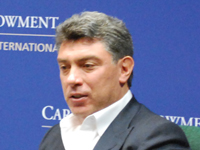Registration
You will receive an email confirming your registration.
IMGXYZ2367IMGZYXBoris Nemtsov, former deputy prime minister of Russia, member of the Solidarity democratic movement, and a prominent Kremlin opposition leader, spoke at Carnegie in June 2009 about the state of democracy in Russia, following the spring 2009 mayoral elections. He returned nine months later to provide an updated assessment of the latest domestic political developments in Russia.
Lack of Political Progress
In June, Nemtsov had expressed guarded optimism about Medvedev’s prospects for democratizing Russia’s domestic politics. With little political progress made in the intervening months, Nemtsov now urged international observers to ignore Medvedev’s rhetoric in favor of his actions. In his opinion, the most significant achievements of the Medvedev presidency thus far are:
- the constitutional change which allows Prime Minister Putin to run for an extended presidential term in 2012; and
- the recognition of sovereign Abkhazia and South Ossetia.
Protests Against Putin
Nemtsov noted an increase in anti-Putin protests across the country, with the largest taking place in Kaliningrad in January. The protest in Kaliningrad caught national attention, coming at the convergence of several local and national issues:
- Vertical Power: Kaliningrad’s protest was in large part a result of the Kremlin’s top-down approach to governing the country, personified by multi-millionaire Kaliningrad Governor Georgy Boos.
- The Economy: Kaliningrad, like much of the country, suffers from high unemployment and inflation. Since Kaliningrad is an exclave territory, however, the Kremlin has less ability to control its economy, and visa regulations inhibit the mobility of the workforce to look for jobs outside the territory during these difficult economic times.
- The Environment: While environmental issues were not particularly prominent in Kaliningrad, anti-government protests in Baikal and Irkutsk placed heavy emphasis on the Kremlin’s approach to the local environment. Both Baikal and Irkutsk are considered environmentally critical regions, where the Kremlin’s potentially hazardous environmental policies are so unpopular that they can bring about social unrest.
A Strategy Going Forward
Nemtsov said that trends are beginning to change, and the opposition should be ready to commit to a long “marathon,” by supporting regional protests throughout Russia. He suggested that the strategy of all opposition parties in Russia should be to unite in a coalition against the current ruling tandem of Putin and Medvedev. This coalition should concentrate on “de-Putinization,” by educating the people about the problems inherent in the current system, such as corruption, a commodity-driven economy, financial crisis, and a growing bureaucracy. “De-Putinization means a more European Russia,” Nemtsov said, “This is my dream, and the dream of many people in Russia.”
